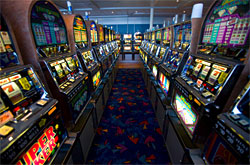Poll


Due to the way slot machines are programmed, about 82 to 98 percent of the money players bet are supposed to pay back as winnings. This is called "theoretical payout percentage", or "return to the player". Theoretical payout percentages are regulated by law or regulations. For example, slots percentages in the state of Nevada make 75%.

Winning patterns (those representing the amounts and frequency of the slots payouts) are arranged in such a way that there remains a certain part of money gained by the "house". It is known as the hold percentage (the term quite similar to the house edge in other casino games). Hold percentages are calculated by subtracting return to the player from 100%. This way, if the payout percentage of a slot machine makes 95%, hold percentage of the house will make 5% (100% minus 95%).
For example, if a single spin of the slot machine costs $1, in a long enough period of time, say 1,000,000 spins, the players' payout percentages will make approximately $950,000 (in case the slot machine pays at 95%), while the house will keep the remaining $50,000.
The probabilities of each payout on the slot payouts table are also important for calculating payout percentages. A machine may have a whole range of different values represented on the payout table. In fact, the slot machines odds of getting every payout are zero except for the largest one. In case the player is paid out 1,000 times his or her wagered amount of money, which happens every 1,000 times, the theoretical payout percentage will make 100%, but it won't be exciting to play anymore. Besides, most players would win nothing, but it is impossible to make records in the payout tables with zero payout percentages.
Theoretical payout percentages for the slot machines are set when the machines are manufactured. Most casinos order machines with certain percentages. To change the pre-programmed payout settings for the machine the casino authorities are supposed to physically remove the computer chip installed in the slot machine. It is a time-consuming process and is seldom done.
Typical payout percentages are different depending on what country you are in and what the denomination for the slot you are playing is. The most popular gambling locations usually offer the most favorable return to the players, just like the payout percentages are higher for games with higher denomination.
The machines that are pre-programmed to pay out more often are known as "loose" slot machines. Of course, in fact all outcomes depend on the Random Number Generator, and the chances the winning combination will hit or will not hit are equal, even if the machine has paid out more often at a certain period of time. Besides, the basic recommendation on how to win at slots is to choose machines with higher payout percentages rather than the machines that pay out more frequently.